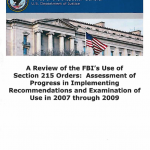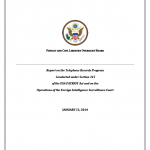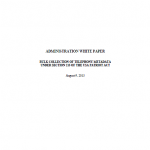
This Executive Summary provides a brief overview of the results of the Department of Justice (Department or DOJ) Office of the Inspector General’s (OIG) third review of the Federal Bureau of Investigation’s (FBI) use of the investigative authority granted by Section 215 of the Patriot Act. Section 215 is often referred to as the “business record” provision. The OIG’s first report, A Review of the Federal Bureau of Investigation’s Use of Section 215 Orders for Business Records, was issued in March 2007 and covered calendar years 2002 through 2005. The OIG’s second report, A Review of the FBI’s Use of Section 215 Orders for Business Records in 2006, was issued in March 2008 and covered calendar year 2006. This third review was initiated to examine the progress the Department and the FBI have made in addressing the OIG recommendations which were included in our second report. We also reviewed the FBI’s use of Section 215 authority in calendar years 2007, 2008, and 2009.


